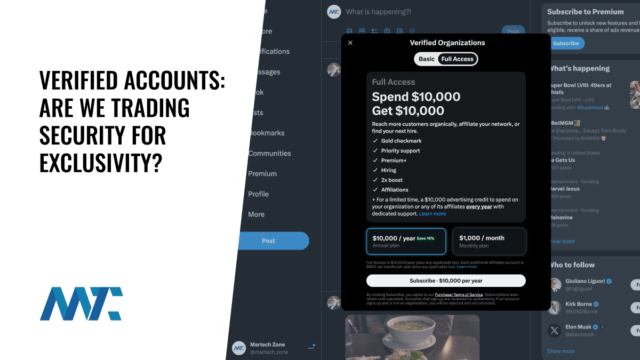Social media platforms have become central hubs for communication, business, and information sharing. Verified Accounts are now a hallmark of authenticity and trust among these platforms’ features. Initially designed to prevent impersonation and ensure the credibility of high-profile accounts, the verification mark has now become a coveted status symbol that extends your reach and acceptance.
As we navigate the complexities of digital identity, the practices surrounding verified accounts reveal a nuanced landscape of benefits and challenges, touching upon the broader discourse of the internet’s democratization and the encroaching pay-to-play dynamics.
The Good: Safety, Credibility, and Reduced Fraud
Verified accounts serve as a beacon of authenticity in a sea of digital anonymity. For public figures, celebrities, brands, and businesses, verification protects against impersonation, safeguarding their identity and ensuring followers engage with the genuine entity. This level of security is crucial for the protection of the account holder’s reputation and the safety of users, who rely on verified badges to discern trustworthy sources of information and products.
Beyond individual safety, verified accounts contribute to a healthier online ecosystem by mitigating fraud. They make it harder for scammers to create convincing fake accounts, thus protecting users from phishing attempts and deceptive practices. In this regard, verification is a critical step toward maintaining integrity and trust on social media platforms.
Moreover, verified accounts can play a role in combating online bullying and harassment. By holding account holders to identifiable standards, social media platforms can enforce their policies against harmful behaviors more effectively, making the online space safer for everyone.
The Bad: The Cost of Verification and Limited Accessibility
Despite their advantages, the mechanisms behind obtaining a verified badge have sparked controversy, particularly around the policies of platforms like X, which introduced a subscription model for verification. This pay-to-play approach has raised concerns about the inclusivity and fairness of verified status. When verification requires a financial investment, it inevitably becomes less accessible to individuals and small businesses operating on tight budgets. This exclusivity can limit the reach and visibility of deserving voices, potentially stifling diversity and innovation on these platforms.
The cost of verification, where applicable, varies widely across platforms and can be prohibitive for many. We’d love to verify our Martech Zone X account… but the subscription costs $2,000 annually for a basic business verification… and costs $10,000 annually to capitalize on all of its benefits… including a 2x boost in visibility.
Eroding the Promise of Democratization
This financial barrier challenges the principle of equal opportunity online and raises questions about the true value of verification. Is it becoming a commodity reserved for those who can afford it rather than a mark of authenticity and trust?
The broader implication of monetized verification systems is their impact on the democratization of the web. Social media has long been celebrated as a leveling field where anyone, regardless of background or financial capacity, could gain visibility and influence.
How can a small publication like mine compete with a mega-publisher that can absorb that expense? I want to support the social media platforms that extend my reach… but I also can’t just drop $10,000 with the hopes that it will drive the traffic and revenue needed to justify the expense.
The emerging trend of pay-to-play visibility threatens to undermine the promise of democratization, privileging those with the means to secure their verified status over potentially equally deserving but less financially equipped individuals and companies.
The Path Forward
A balanced approach is necessary for social media platforms to truly harness the positive potential of verified accounts while mitigating their drawbacks. Policies around verification should prioritize accessibility and fairness, ensuring the process is transparent and equitable. Platforms could consider alternative verification methods that do not solely rely on financial transactions, such as rigorous identity checks or community endorsements, to maintain the integrity and inclusivity of the digital space.
I would be more than happy to pay for verifying Martech Zone as a business on X… even ensuring that X makes a profit on the service. Why not just offer a verification service that costs as much as registering your corporation annually? I want our social media followers to see us as a verified organization… but $2,000 is a bit much to get a little checkmark on our account that may not have any return on investment.
Look, the role of social media companies in fostering a safe, trustworthy, and democratic online environment cannot be overstated. As these platforms continue to evolve, they must remain vigilant in adapting their policies to serve the best interests of the global community, safeguarding the ideals of openness and equality that have long been the internet’s hallmark.
Verified accounts on social media platforms offer a mixed bag of benefits and challenges. While they enhance safety, credibility, and trust online, the associated costs and accessibility issues pose significant concerns. As we move forward, the balance between security and inclusivity will be pivotal in shaping the future of digital identity and the internet’s democratic promise. By re-evaluating the principles behind verification, social media platforms have the opportunity to reinforce their role as equitable spaces for connection, expression, and business.
©2024 DK New Media, LLC, All rights reserved.
Originally Published on Martech Zone: Verified Accounts: Are We Trading Security for Exclusivity?

